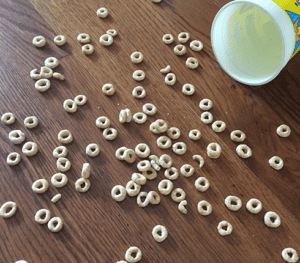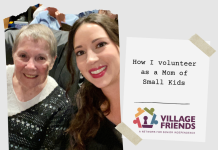 She looked at me, calmly held out her full cup of cereal, turned it upside down, and never broke eye contact. It was a defining moment for both of us. I knew my next move would impact our future relationship and to give ground now would definitely be a mistake.
She looked at me, calmly held out her full cup of cereal, turned it upside down, and never broke eye contact. It was a defining moment for both of us. I knew my next move would impact our future relationship and to give ground now would definitely be a mistake.
Our children get it honest. They have two very determined parents, who also had very determined parents, who also…well, let’s just say it’s a family trait. They have unique personalities, but all three have strong wills. Over time, I came to understand the twinkle in my mother-in-law’s eye as she handed us our very own copy of “The Strong-Willed Child.” I saw it again when she gave us, “Parenting Isn’t For Cowards.”
Rearing young humans is hard work and molding character is challenging on the best of days. There are a few things we learned that made the experience much easier on all of us, parents and kids.
Establish early that you are the parent.
That’s important on a number of levels, including the fact that their safety often depends on immediate obedience-“Stay out of the street,” Don’t go near the water,” “Don’t put that into your mouth.” We taught them early that not to obey at once was to disobey. Let’s be real, bringing up productive members of society requires teaching them to submit to authority. It makes life together on this planet much more pleasant and to function effectively someone needs to be in charge.
But, as another popular movie quote says, “With great power comes great responsibility.” (Spiderman, 2002) Discipline isn’t just about controlling behavior for parent’s comfort, it’s about loving kids enough to stand firm and helping them understand why they have to do things a certain way. After the kids did whatever was required, or received consequences for not doing so, we sat down with them and talked it out, explained the why’s and gave them a hug.
When they got older, we gave them the freedom to disagree with us. Many times, the situation required them to simply do what we said, but when possible, we would listen to what they had to say, consider their viewpoint, and decide whether or not to change our minds on the subject in question. We tried to give them an explanation, though sometimes they had no need, or right, to know our reasons. Our aim was help them learn that life in a system of order is not only better, it allows much more freedom than life in a system of chaos, where everyone does as he or she pleases. We wanted them to know that we loved them too much to let them grow up thinking they were the center of everyone else’s universe. By teaching them to obey us, then to obey teachers, coaches, etc. we wanted them to learn to respect authority over them and to disagree respectfully when they thought something was wrong. We wanted them to learn a way to work things out, and if they couldn’t effect change, at least handle it in a manner respectful of the person in authority. There were times when we felt the person over them was wrong, and if it was important we intervened, but we taught our children to show respect regardless of their feelings and to realize that sometimes as Tom Selleck says, “Life’s not fair, but you can be.”
Be Consistent.
Kent and I heard a sermon years ago by Rev. Bo Childs about disciplining children. He said, “The certainty, not the severity, of the punishment is what counts.” Kids need to know the rules and they need to know that there are consequences if they break those rules. This lesson need not be harsh, but it needs to be predictable. Testing their boundaries is part of growing up; finding those boundaries are still in place gives them a sense of security. So, it’s important to make the rules simple, relevant, and fair-and fair does not always mean everyone gets the same. There are times when grace and mercy are needed in a situation and there are times the consequences are necessary even if the end result turned out okay. It’s an ongoing learning experience for everyone.
What about threats? In one of my education courses in college, my professor cautioned against them. He stressed that clear rules and consistent consequences create a positive environment, but if you make a threat, be prepared to carry it out or you lose your credibility-and credibility is important, easily lost and difficult to regain. Of course, this should be done within reason, but his point was be calm, be in control, and don’t make idle threats. If things are escalating, take a step back, a deep breath, and send the culprit to time out gave you both a moment to calm down and figure out the solution.
We had a chart on our pantry door. As a family, we sat down and decided consequences for some of the regular offenses like arguing, complaining, whining, defiance, etc. All the kids got to weigh in on deciding the consequences. Time out, loss of privileges, extra work-they got to help choose, so when they got caught in an offense, they couldn’t say, “I didn’t know.” It made things easier and there was less complaining.
Last of all, Pick Your Battles.
The art of discipline also requires knowing when to let it go. Micromanaging their behavior can harm your relationship with your kids as much as not managing it enough. Kids will test you and you need to meet the challenge, but sometimes what Dr. James Dobson calls “childish irresponsibility” is to blame. Are they deliberately ignoring the “clean your room” rule, or did they have so much homework this week they fell into bed exhausted every night and forgot? There’s a balance in effective discipline. Sometimes you just say, “Hey, let’s do this together. You’ve had a lot on your plate this week.” If your child realizes you care, that you’re not just there to “boss them,” your relationship grows deeper. Then, when they think their world is falling apart, they’re more likely to come to you for help. In the grand scheme of things, is that strange haircut that important? Are they compliant on the big stuff? Let it go. It’ll grow out…maybe, or not, but is it really that big a deal? We want them to grow into their own unique selves, not carbon copies of us or little robots that won’t ever stand up for what they believe to be right. We found that by getting the small stuff into perspective, when we had to bring up the big things we had more impact.
As for the cereal incident, I sat down across from her. We faced each other over the contents of her morning snack, and I calmly said, “Pick them up, please.” No drama, no raised voice, just the fact that we weren’t getting up until it was done. We started with me taking her hand, picking up a few, and moving it to the cup. She gradually backed down and did the job herself, though it took a while. When the task was finished, I explained to her that, “I’m the mom and you have to do what I say. I love you and because of that I will teach you to obey because that’s important.” There were more battles, but next time the battle was a bit easier because she realized I meant what I said.
Learning to be firm, fair, and consistent, and to pick my battles, many times came from trial and error and always from much prayer. And when they hit the teenage years, those strong wills were a good thing where temptation and peer pressure were concerned, and the fact that they had learned early on that there was always a good reason for what we asked of them made navigating that season so much easier. The trust we had built through perseverance in discipline made a huge difference, and the window into their world we gained through staying engaged enabled us to empower them to avoid many of the pitfalls of the teenage years.
“The force is strong with this one.” Darth Vader (A New Hope) copyright Lucasfilm Ltd./Twentieth Century Fox Film Corp. May 25, 1977. britannica.com
Spiderman, 2002, Sony Pictures quote by Stan Lee Amazing Fantasy #15 1962, from weminoredinfilm.com
“The Strong Willed Child” Dr. James Dobson
“Parenting Isn’t For Cowards” Dr. James Dobson











